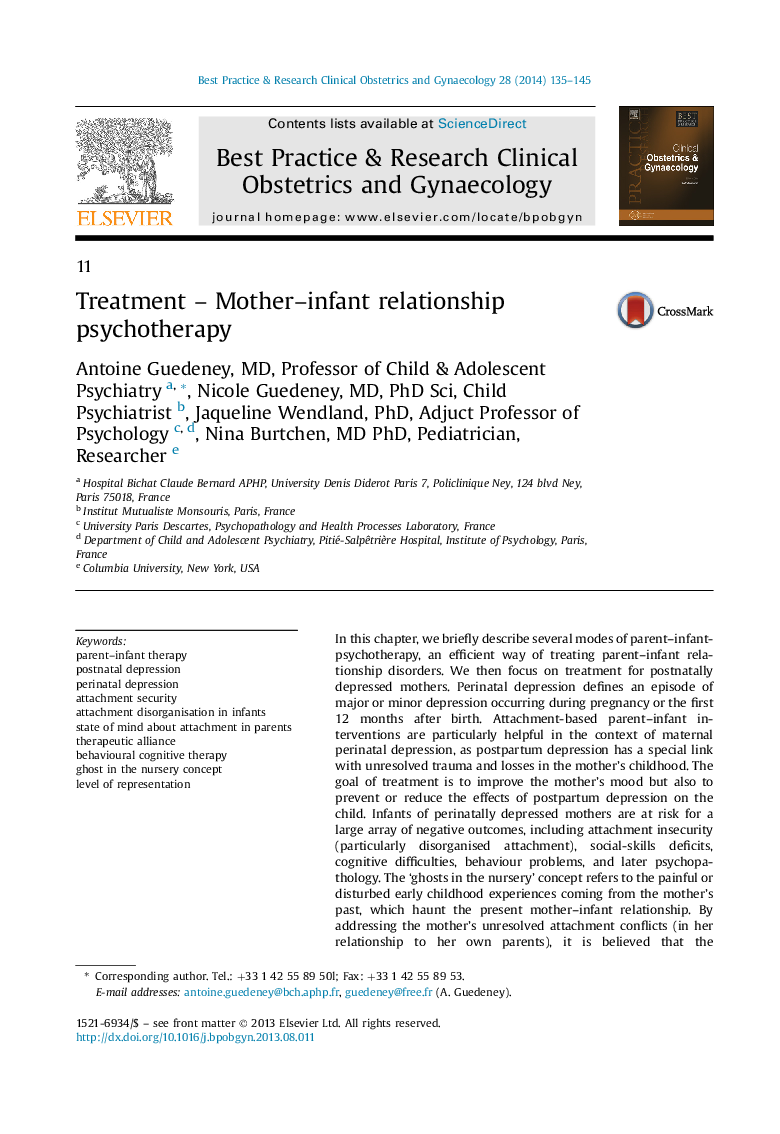| کد مقاله | کد نشریه | سال انتشار | مقاله انگلیسی | نسخه تمام متن |
|---|---|---|---|---|
| 6169200 | 1251054 | 2014 | 11 صفحه PDF | دانلود رایگان |
عنوان انگلیسی مقاله ISI
Treatment - Mother-infant relationship psychotherapy
ترجمه فارسی عنوان
درمان - روان درمانی روابط مادر و نوزاد
دانلود مقاله + سفارش ترجمه
دانلود مقاله ISI انگلیسی
رایگان برای ایرانیان
کلمات کلیدی
پدر و مادر نوزاد درمانی، افسردگی پس از زایمان، افسردگی پرناتال امنیت ضمانت، بی نظمی دلبستگی در نوزادان، وضعیت ذهن در مورد دلبستگی در والدین، اتحاد درمانی، درمان شناختی رفتاری، شبح در مفهوم مهد کودک،
ترجمه چکیده
در این فصل، ما به طور خلاصه چند حالت روانشناسی والد-نوزاد را که یک روش کارآمد درمان اختلالات روانی مادر و نوزاد است را توصیف می کنیم. سپس در درمان مادران افسرده پس از زایمان تمرکز می کنیم. افسردگی پس از زایمان یک قسمت افسردگی عمده یا جزئی را که در حین بارداری یا 12 ماه اول تولد رخ می دهد، تعریف می کند. مداخلات والدین و نوزادان مبتنی بر پیوستگی در زمینه افسردگی پرناتال مادر مفید است، زیرا افسردگی پس از زایمان ارتباط ویژه ای با آسیب های ناشی از حل و فصل و خسارت در دوران کودکی مادر دارد. هدف درمان بهبود خلق و خوی مادر است و همچنین جلوگیری یا کاهش اثرات افسردگی پس از زایمان بر روی کودک است. نوزادان مادران مبتلا به پرناتلادی در معرض خطر عظیمی از پیامدهای منفی، از جمله عدم امنیت دلبستگی (خصوصا دلبستگی ناخوشایند)، کمبود مهارتهای اجتماعی، مشکلات شناختی، مشکلات رفتاری و بعدها آسیب شناسی روانی هستند. مفهوم "ارواح در مهد کودک" به تجربیات دوران کودکی دردناک و ناراحت کننده ای که از گذشته مادر منتهی می شود اشاره می کند که از رابطه مادر و نوزاد کناره گیری می کند. با توجه به اختلافات دلبستگی حل نشده مادر (در ارتباط او با والدین خود)، اعتقاد بر این است که توسعه فرزندپروری سازگارتر و پیوستگی امن تر و غیرمذهاری بین مادر و نوزاد او تسهیل شده است. تغییرات تعامل والدین و نوزاد به پورت ورودی وابسته نیست (مثلا رفتار کودک، نمایندگی والدین یا رابطه والد و نوزاد). چشم انداز دلبستگی کلید نصب یک اتحاد درمانی با والدین است.
موضوعات مرتبط
علوم پزشکی و سلامت
پزشکی و دندانپزشکی
زنان، زایمان و بهداشت زنان
چکیده انگلیسی
In this chapter, we briefly describe several modes of parent-infant-psychotherapy, an efficient way of treating parent-infant relationship disorders. We then focus on treatment for postnatally depressed mothers. Perinatal depression defines an episode of major or minor depression occurring during pregnancy or the first 12 months after birth. Attachment-based parent-infant interventions are particularly helpful in the context of maternal perinatal depression, as postpartum depression has a special link with unresolved trauma and losses in the mother's childhood. The goal of treatment is to improve the mother's mood but also to prevent or reduce the effects of postpartum depression on the child. Infants of perinatally depressed mothers are at risk for a large array of negative outcomes, including attachment insecurity (particularly disorganised attachment), social-skills deficits, cognitive difficulties, behaviour problems, and later psychopathology. The 'ghosts in the nursery' concept refers to the painful or disturbed early childhood experiences coming from the mother's past, which haunt the present mother-infant relationship. By addressing the mother's unresolved attachment conflicts (in her relationship to her own parents), it is believed that the development of a more adaptive parenting and a more secure and less disorganised attachment between the mother and her infant is facilitated. Changes in parent- infant interaction are not dependent on the port of entry (e.g. child's behaviour, parent's representation or parent-infant relationship). The perspective of attachment is key to install a therapeutic alliance with parents.
ناشر
Database: Elsevier - ScienceDirect (ساینس دایرکت)
Journal: Best Practice & Research Clinical Obstetrics & Gynaecology - Volume 28, Issue 1, January 2014, Pages 135-145
Journal: Best Practice & Research Clinical Obstetrics & Gynaecology - Volume 28, Issue 1, January 2014, Pages 135-145
نویسندگان
Antoine (Professor of Child & Adolescent Psychiatry), Nicole (Child Psychiatrist), Jaqueline (Adjuct Professor of Psychology), Nina (Pediatrician, Researcher),
